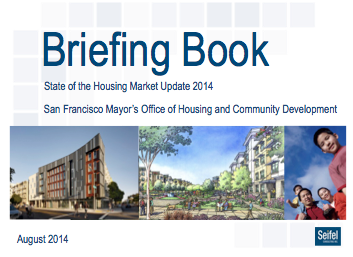Client: San Francisco Mayor’s Office of Housing
 Since 2011, Seifel has advised the San Francisco Mayor’s Office of Housing on affordable housing policies and programs. Seifel prepared and recently updated San Francisco’s State of the Housing Market Update, which evaluates the City’s housing market and demographic characteristics to help understand how economic trends and real estate prices have affected housing affordability, particularly for households earning between 50% to 150% of area median income.
Since 2011, Seifel has advised the San Francisco Mayor’s Office of Housing on affordable housing policies and programs. Seifel prepared and recently updated San Francisco’s State of the Housing Market Update, which evaluates the City’s housing market and demographic characteristics to help understand how economic trends and real estate prices have affected housing affordability, particularly for households earning between 50% to 150% of area median income.
Our evaluation of housing market conditions included review of a variety of data sources, including private market data sources (such as Zillow and RealFacts), as well as public data from the 2010 Census, American Communities Survey, California Employment Development Department and US Bureau of Labor Statistics. Our analysis evaluated changes in housing affordability for households at various income levels over time. The study explored housing needs in relation to local housing prices, new housing production and other effects of the current market.
Seifel also analyzed the financial feasibility of the City’s residential housing fee and inclusionary housing program under a range of development types and factors affecting financial feasibility, such as development size, tenure, land cost and development impact fees. Based on detailed review of historical production and pipeline development, as well as input from a broad-based Technical Advisory Committee and City staff, four representative building types were selected for the financial analysis, along with variations to account for rental and for-sale housing.
For each building type, a typical development program (building profile) was prepared based on input from the TAC and City staff, interviews with developers, contractors and real estate professionals, and an analysis of key assumptions from more than 20 development pro formas of projects recently constructed or in the development pipeline. Seifel’s financial analysis compared the anticipated development costs with the potential revenues that could be generated for each prototype in order to test the overall financial feasibility using typical measures of return on equity investment and developer return. Based on this data, Seifel also calculated an updated affordable housing fee using the city’s fee formula that measures the difference between total development costs for three prototypical building types and the affordable housing sales price.
